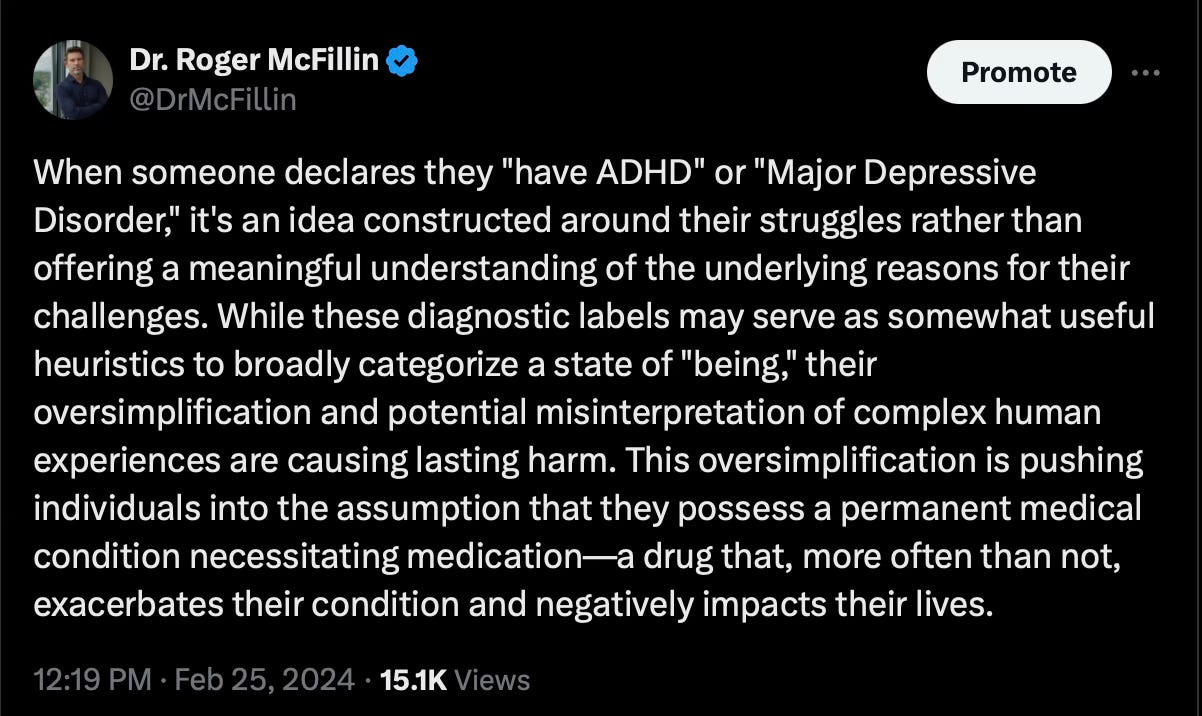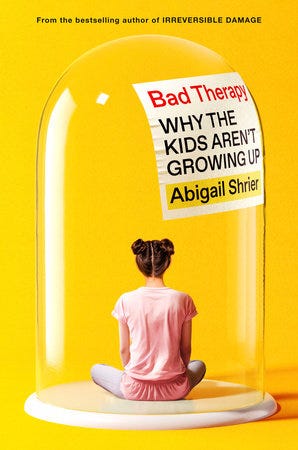When at a cocktail party and you encounter someone new what is often the first question asked?
"What do you do?"
This reflects how our careers have become deeply woven into our sense of identity. Our jobs reveal more than just how we support our families and lifestyle; they reflect our education, interests, personality, and socioeconomic status. It's like presenting a brief biography during introductions, offering a snapshot of our lives.
“Oh a psychologist…. are you analyzing me?” Ha, Ha, Ha (not funny).
“Now I am after that comment!” Ha, Ha, Ha
Next…
Exploring common ground for connection, people often explore topics like family, mutual connections, where you are from, and hobbies. These shared experiences serve as bridges to establish a sense of familiarity and connection to further the conversation.
Our personal identity is shaped by the stories we tell ourselves about who we are in this world. What defines us? What makes us unique? In relation to others, who are we? What value do we hold?
Emotional struggles often stem from the narratives people construct about themselves. These self-generated stories can manifest as feelings of inferiority and a negative self-concept, perpetuating a cycle of intense shame. Individuals who define themselves by their failures, trauma, perceived weaknesses, or negative interactions may find themselves trapped in the narratives they've internalized. This can lead to persistent feelings of shame and anxiety, hindering personal growth and well-being.
The notion of viewing oneself as broken, disordered, mentally ill, or unstable is generally aversive, and most people actively try to avoid such self-perceptions. This inclination reflects a natural resistance to identifying with labels that carry negative connotations and stigmas.
Identity Development and Adolescence
Adolescence marks a crucial period for identity development. During this phase, many teens and young adults shape their identity based on their interests and shared peer groups. Whether it's athletes, artists, the popular crowd, or various classification groups, teens define themselves within these spheres during this formative time. A group identity starts to take shape based on various elements, including the fashion they choose to wear and the manner in which they express themselves. These outward manifestations contribute to the formation of a collective identity within the group.
Indeed, we have a tendency to categorize people into in-groups and out-groups, forming judgments based on perceived similarities or differences. The quick assessments of "You are like me, so I can trust you" versus "You are not like me, and I'm uncertain about trusting you" reflect the heuristics we use, often rooted in inherent biases. These cognitive shortcuts, while stemming from evolutionary advantages, can also contribute to and perpetuate biases in our social interactions.
What is Socially Adaptive?
In social contexts, it's generally seen as socially adaptive to present oneself in a favorable light. Demonstrating emotional stability, kindness, humor, confidence, and intelligence are regarded as valuable attributes. These qualities not only contribute positively to group dynamics but also facilitate the formation of meaningful connections and enhance one's prospects in finding a romantic partner. Such characteristics are often seen as markers of maturation and personal growth.
In a traditional sense, if someone struggles to keep a job, appears emotionally unstable, lacks confidence, and hasn't figured out how to integrate into society, they face legitimate challenges in forming valuable social connections and achieving financial stability.
Certainly, identifying oneself through being "mentally ill" or associating with a psychiatric diagnosis is the last thing someone would naturally choose as an identity marker. This choice feels entirely unnatural, seemingly conflicting with the laws of nature and evolution, and it defies traditional social conventions. And there's a good reason for that!
The increasing trend of people seeking and self-identifying with psychiatric labels prompts the question: What is actually happening? If identifying with such labels seemingly violates the laws of nature, it suggests that this behavior is learned—a social contagion gaining reinforcement in our society.
Culture Shapes Behavior
Currently, influencers on social media and YouTube are building personal brands around various mental health conditions like bipolar disorder, autism, ADHD, dissociative identity disorder (formerly multiple personality disorder), borderline personality disorder, PTSD, and whatever diagnoses become trendy. On twitter (X) you have a limited amount of characters in your bio. We are seeing #actuallyautistic; #ADHD;#bipolar;#neurodivergent;#depression. The manner in which they describe their conditions is framed as the primary reason for almost every struggle they have in life. In fact, it often goes far beyond the actual characteristics of the condition, to the extent that it no longer accurately reflects what is true.
As psychiatric labels are more of social constructs than strictly medical categories, they are highly susceptible to the dynamics of social contagion in this online era. If a psychiatric diagnosis is perceived as genetic, permanent, and indicative of a disability, individuals might attribute their quirky personality, emotional distress, relationship difficulties, and poor focus to this medical condition. The lens of a psychiatric label can shape how people interpret and understand various aspects of their identity and behavior.
In many cases, embracing a psychiatric diagnosis serves as a declaration of perceived incapacity to meet societal expectations, attributing it to a genetic condition. Seeking solidarity within a shared disability, the truth of their abilities becomes distorted, shaped by the persuasive power of their narrative, regardless of its accuracy.
We are creators of our own reality.
If mental illness is truly stigmatized, why the escalating trend of young people eagerly self-diagnosing? What compels them to actively seek out these labels?
We're observing a deliberate dismantling of our cultural norms and values. Any society that actively undermines and weakens its younger generation by promoting psychiatric diagnoses as immutable traits perpetually hindering their capacity to forge a meaningful, purposeful life is effectively brainwashing them into believing they are inherently flawed and incapable.
This defies natural law and human instict. Our inherent drive is to create, thrive, overcome, learn, and grow. Yet, for some reason, psychiatric diagnoses are wielded as validations of struggle and badges of disability status. This phenomenon is a reflection of the dynamics at play in our world of identity politics and cultural Marxism.
Consider what Generation Z is learning. Success is linked to inherent privilege based on skin color rather than personal attributes, discipline, mindset, or talent. Accomplishment is only valid if one has a disability or minority status. This skewed perspective fosters a pervasive sense of shame around being "normal" and, in extreme cases, fuels anger and resentment towards those perceived as stable, successful, and achieving as if they are privileged.
Yes, being emotionally stable and having friends is a “privilege”. Spare me with this harmful rhetoric. Please.
While it might sound absurd at first glance, what I'm witnessing in clinical practice indicates a widespread embrace of an ideology that favors using psychiatric diagnoses to validate normal developmental stressors and challenges as some indication they are experiencing a “disorder”.
Rejecting the existence of a psychiatric illness and opting to normalize reactions is increasingly met with a profound sense of invalidation. Throughout my career, I've observed a shift from cautiously guarding individuals against unnecessary psychiatric labels that presume severe impairment and carry potential for legitimate discrimination, to the widespread application of these diagnoses to anyone experiencing distress. It's a concerning trend where normal reactions are being medicalized.
Apparently everyone “has ADHD” now… and it is a problem.
My aversion to the psychiatric industrial complex and psychiatry stems from the alarming ease with which labeling and medicating occur. If I had $5 for every instance where an adolescent was prescribed psychiatric drugs following a breakup, a fight with friends, parental divorce or any other routine life event, I'd be a wealthy man.
Rather than normalizing life challenges and protecting young people from unnecessary and baseless classifications of mental illness, we are subjecting them to propaganda such as "decrease stigma campaigns." These campaigns inaccurately portray emotional and behavioral struggles as a medical condition requiring intervention. As if we need to decrease the shame that comes with getting help! What??!!!
If there's any stigma attached to seeking mental health assistance, I certainly do not see it. By what measure? Nowadays, everyone seems eager to have a therapist.
It's no surprise that young people are finding it hard to navigate life's challenges. They are consistently informed that any unpleasant emotions or tough experiences might indicate a psychiatric illness. Considering that adolescents are in a unique stage of identity development, it's perfectly normal for them to explore different aspects of themselves. However, what they encounter is social media propaganda and internet sites compelling them to assess every negative aspect of themselves through the lens of a DSM diagnosis.
Oh.. that is me! I have this! This is why I have struggled so much!
In reality, psychiatric diagnoses differ from tangible conditions such as cancer, strep throat, or autoimmune diseases. They merely serve as a classification for observed "symptoms" or behavior patterns, using a crude, invalid, and oversimplified approach. These diagnoses fall short in explaining the root cause of someone's struggles and should not be equated with diseases or medical conditions that warrant curative treatments. Unlike cancer treatments targeting cancer cells or antibiotics eliminating bacteria, psychiatric drugs lack a medicinal quality and don't restore the body to a state of health.
More importantly, we have an increasing number of people who identify themselves as fragile, disabled and incapable. This is the mental illness.
We urgently need professionals to break free from the psychiatric cult. Let's ditch the fear mongering and return to common sense strategies for building resilience, managing stress, and solving problems. Instead of instilling fear and outsourcing “mental health” to a professional let's communicate what's developmentally normal and empower parents to trust their instincts in raising their kids. Not everyone needs therapy!
I'd like to express my gratitude to independent journalist and author Abigail Shrier for giving me a shout-out on Joe Rogan's podcast.
Her new book is an exposé on the mental health industry, uncovering a troubling reality. Despite the increased accessibility and exposure to mental health therapies for younger generations, they struggle more with mental health than any previous generation. The book is well researched and articulate important messages. Our efforts seem to be inadvertently creating a generation characterized by fragility, neurosis, and identity confusion. A must read!
A movement is emerging to restore sanity (pun intended). The more we emphasize drugs, diagnoses, and a neurotic self-focus in therapy, the more we contribute to a generation struggling to cope with the harsh realities of life. If mental health therapies do not improve peoples ability to cope with the demands of life… what is the point?
The cure has become the disease.
Resist
No more bystanders









I so appreciate this article and your work pushing back against the psychiatric colonization of our collective social/spiritual/emotion/mental landscapes. Having been falsely and irresponsibly labelled in my teens by professionals as having an incurable personality disorder, it's taken me 40 years to reframe my story from one of broken-ness and shame to embracing that young woman so desperately seeking help to survive emotionally within a household of abuse and silence.
I would add that these young people aren't just framing their own emotional difficulties in a mental health framework, but everyone else's emotional struggles as well. Therapists - not each other and our non-paid loved ones - are supposedly the only capable helpers. people are unlearning or never learning how listen and be with our loved ones when they are in pain.
I’m really grateful for your articles and enjoy them all. As a father of 7 young kids, sadly, I observe the trends you identify on a daily basis. I do want to push back on one thing, admittedly insignificant as it relates to the article, but worth noting because I do so rarely (perhaps almost never) disagree with any thing you write. Characterizing divorce as a “routine life event.” That’s not to suggest that a child of divorce requires a diagnosis or meds. Kids are, of course, incredibly resilient. But it’s just a recognition that the prevalence in our society by no means makes divorce “routine.” It’s so often an atomic bomb dropped on a child’s world. Thus, I don’t think it’s appropriate to include as an example of routine life events.